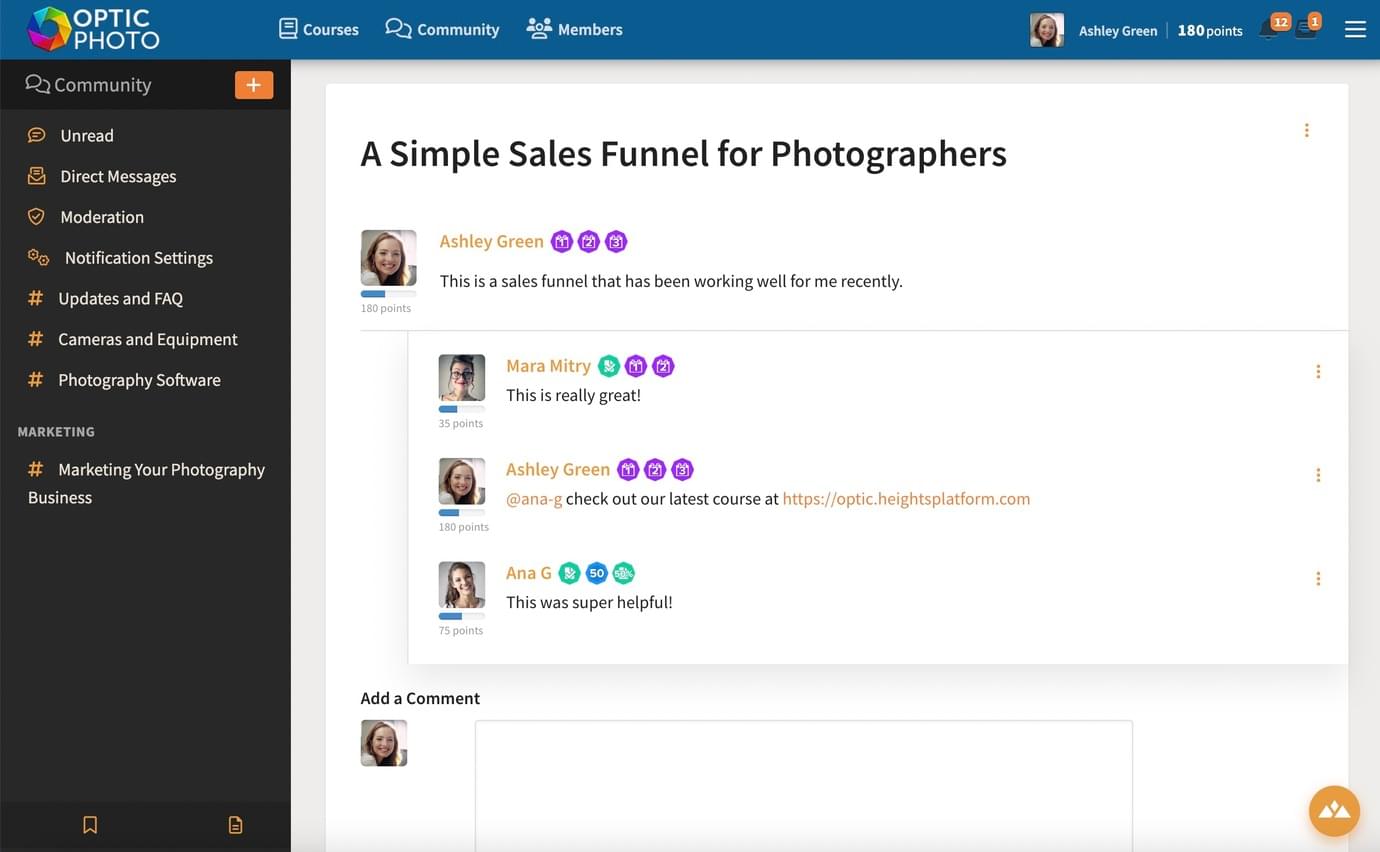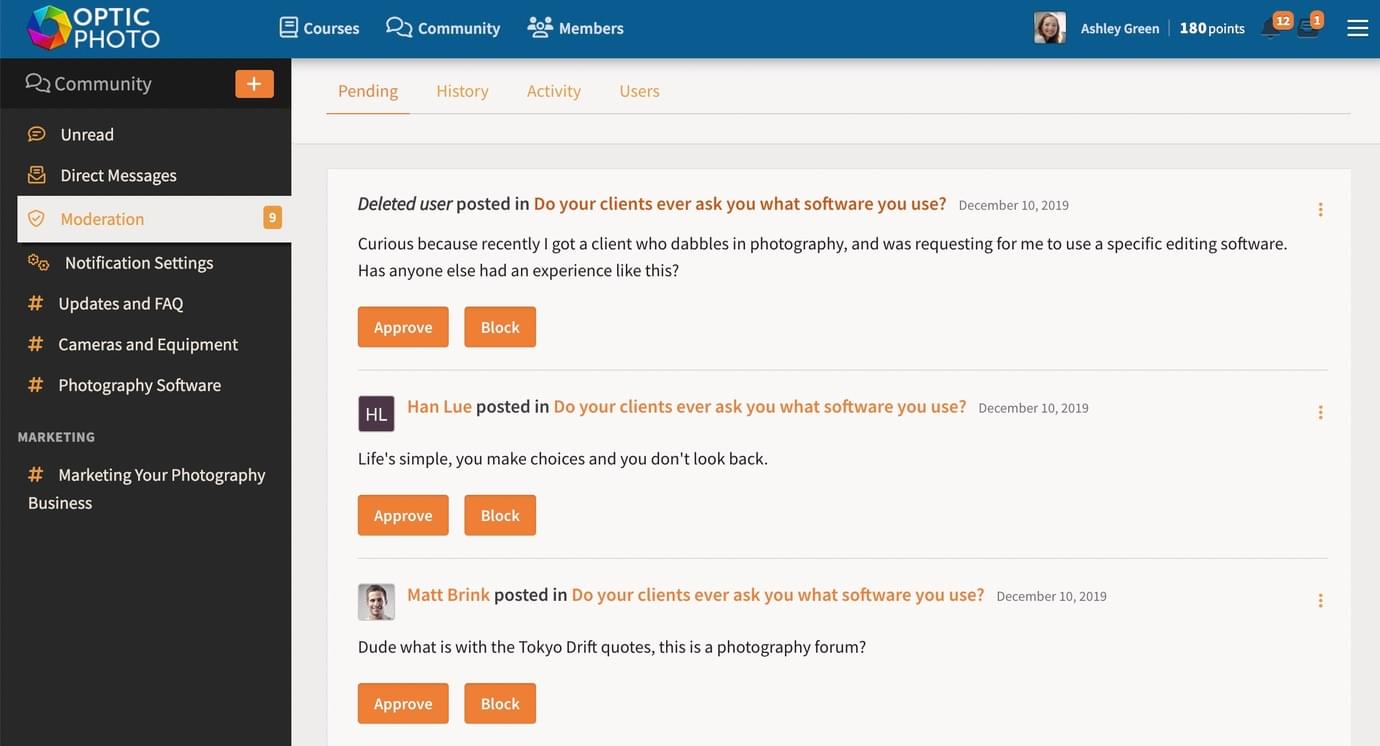Best Alternative to Facebook Groups to Build a Community
6 minute readFacebook groups have been extremely popular in the past year, as a way to build communities and communicate online, with millions of people using them to connect with like-minded individuals and discuss various topics.
However, as Facebook's privacy policies have come under scrutiny and users have become increasingly aware of the limitations of the platform, many are looking for alternatives.
We recently moved our community from a Facebook group to Heights Platform, so we wanted to share our experience and motivation behind this choice.
Our former Facebook group was designed to keep in touch with our customers and assist them in building their online courses.
In our experience, Facebook groups did not offer tools to keep the members engaged with the community, and its algorithm didn't allow us to properly reach our audience, resulting in having to pay for retargeting ads even to simply reconnect members to the group.
Facebook is built to be a distraction engine, making it harder for people to focus on the group content, as they get notifications pulling them to other places so they can be shown more ads.
Now that we moved the whole group inside Heights Platform, our software, we can better engage our members, structure the community in the best way, better moderate the community and reach our audience.

In today's article, we will explore the best options for those seeking to build a community outside of Facebook groups and show you the best Facebook group alternatives to choose from today.
Why You Should Not Use Facebook Groups to Host a Community
While Facebook groups have been a popular platform for community building, they are not without their limitations. There are several key drawbacks of using Facebook groups to host a community, including:
Limited customization options
Facebook groups have limited customization options, which can make it difficult for online communities to personalize their platform and create a unique identity. Customization options such as custom themes, logos, and branding can help creators to align their community space with their brand.
Lower Engagement
With so many notifications and distractions, it's easy for Facebook group users to feel overwhelmed and their messages get lost in the noise.
Facebook is incentivized to keep your group members distracted and bring them to other parts of the platform so they can be shown more ads.
This makes it challenging to effectively reach Facebook group members - even those who have joined the Facebook group and are active in the space. It can be hard for creators to keep their community members engaged.
Decreased discoverability for online communities
Facebook's algorithm can make it difficult for online communities to be discovered by new potential community members. This can limit the growth and reach of a Facebook group and make it harder to connect with like-minded individuals.
Lack of control over audience and privacy
In a Facebook group, you do not have ownership over your audience.
Facebook groups have also been criticized for the privacy policies of the social media platform, and many users are concerned about the amount of data that is collected and shared.
Creators may not have complete control over their members' data privacy, which can be a major concern for many.
Difficulty in moderation
Moderation can be challenging in Facebook Groups, as the platform does not have robust moderation tools and can be difficult to navigate. This can lead to difficulty in enforcing rules, managing community members, and keeping the community safe from spam.
Entrepreneurs and creators often turn to social media platforms, such as Facebook groups, to establish their online communities.
Although these platforms are readily available and offer greater visibility, they may not be the most effective in fostering engagement and retaining members within the community's own space, as we have already seen above.
So what platform should you choose to host an online community other than a Facebook group? Let's see what to look for in a group or community platform.
What to Look for in a Group Platform?
Compared to Facebook groups, online community platforms offer a more customized solution for creators and digital entrepreneurs seeking to build a secure, private, and personalized community space for their members to connect and foster a sense of belonging.

These platforms provide a tailored experience and help to build a robust and engaged community.
There are several key criteria to consider when evaluating alternative platforms to Facebook groups. These criteria will help determine which platform best fits a specific community.
Related article: How to Choose the Right Online Community Platform For Your Knowledge Business
Engagement Tools and User-friendly interface
A platform with a user-friendly interface will make it easy for members to engage with the community, share content, and participate in discussions.
Consider signing up for a free trial to test the user experience, including the ease of finding topics, communicating with other members, and navigating the platform.
Heights Platform is an online course platform that offers a complete online community space for creators and students. Check it out for yourself by creating your free trial.
Customization options
Customization is a crucial aspect of building a paid and private online community. It is important to have a space that seamlessly represents your brand.
This includes adding your logo, incorporating your brand's color scheme and font style, adding images, and your own doamin (things that you cannot do on a Facebook group).
With a visually cohesive and immersive brand experience in your online community, your members will be able to identify your brand easily and comprehend its value proposition.
Flexibility in Structuring the Community
Another important aspect to consider when looking for the perfect online community platform is how to structure the content inside the community space.
While Facebook groups do not allow you to customize the appearance and structure of the community, look for a flexible community platform where you can choose how to display different channels and arrange posts and content as you wish.
Different channels allow members to discuss a variety of topics while keeping content organized and easy to discover for everyone.
All-in-one platform
Online community platforms, including Facebook groups, typically concentrate solely on community features and - in some cases - may provide payment processing, but that is about it.
Heights Platform, on the other hand, takes a different approach. The community area in Heights is only a fraction of what you can build as a creator.
In fact, creators using Heights Platform can sell online courses, coaching products, and other digital products. This allows you to build a complete online knowledge business by selling digital products and offering built-in access to a community, all within your program.
As a result, your online course students and members can easily access the community without having to log in elsewhere.
Monetization
On Facebook groups, you cannot charge a fee for members to access the group. If you want to monetize your private community, you need a platform that allows payment processing and lets you set an entrance fee for community access.
On Heights Platform you can sell access to your online community by setting a one-time fee, charging a monthly subscription, installments and even accepting donations from your community members.
Related articles:
- 14 Proven Ways to Make Money From an Online Community
- How to Price an Online Community: Sell Access to A Community Worth Paying For
Integrations
Integration with other tools can make it easier for members to stay connected with their community and access important information.
Features such as calendar integrations, email notifications, and integration with social media platforms can be incredibly useful in community building.
Ease of moderation
Moderation is a crucial aspect of any community platform, and it is important to choose a platform that makes it easy to manage members, enforce rules, and keep the community safe.
While on Facebook groups you have limited moderation options, look for a platform with robust moderation tools to help ensure the community remains positive and productive (for example, being able to set moderation statuses for comments, not only posts, and to turn off direct messaging).
Privacy and security
We have seen how privacy and security are top concerns for creators who are unhappy with Facebook groups.
Private community platforms with strong privacy policies and security measures will help protect members' personal information and ensure that their online conversations remain confidential.
The Best Alternative to Facebook Groups
By considering the criteria outlined above, creators can find the best alternative to Facebook groups for their specific needs and requirements.
So which platform is the best Facebook group alternative?
Heights Platform's community is one of the best alternatives to Facebook groups, as it offers all the features lacking in the social media platform that helps creators build engagement in an online community.
On Heights, you can structure your community the way you want!
You can create different channels of communication (public and private channels) to discuss various topics with your members. You can group these channels into "channel groups" to organize the content neatly.

You can also hide certain channels from a group of students, or grant access to specific channels to other group members. For example, you could leave your whole community free to access, but create a premium channel for which members can pay.
You can also bundle up community channels with certain online courses or digital products you sell to create a promotion or an exclusive deal. This makes Heights a great Facebook groups alternative.
The possibilities are endless with Heights Platform, as you are in control over your content, and you are flexible in choosing how you want to structure your community and your learning program in general.
How can we be so sure about this?
Well, we recently moved our whole community from a Facebook group into the Heights Platform community.
While before we had little control over our audience, no tools to keep our members engaged and limited moderation options - now we can structure the community as we want, keep our members engaged and moderate the community to build a thriving and safe environment for everyone.
Build your own online community today by creating your free Heights Platform account!
Create Your Community Today


